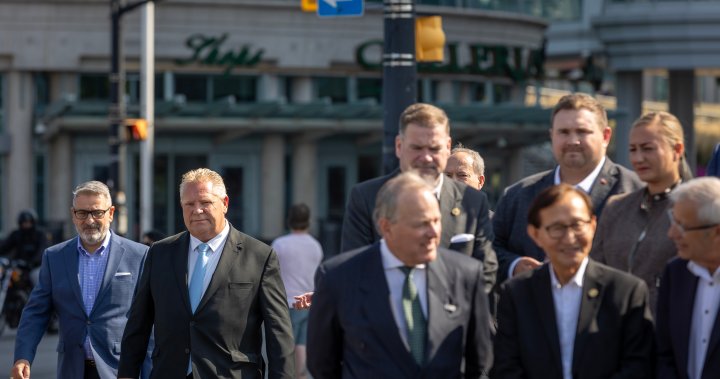Ontario Premier Doug Ford has expanded his cabinet to 37 ministers and associate ministers, breaking his own record for the largest cabinet in the province’s history. The reshuffle was prompted by the resignation of Todd Smith as Minister of Education, with Jill Dunlop taking over the role and her previous portfolio being filled by Nolan Quinn. Additionally, Graham McGregor was promoted to associate minister for auto theft and bail reform. Ford stated that these changes were aimed at rebuilding Ontario’s economy and ensuring public safety.
Critics of Ford have expressed dissatisfaction with the size of the cabinet, accusing the premier of prioritizing his party over the interests of the people of Ontario. This sentiment was echoed by Ontario NDP Leader Marit Stiles, who criticized the timing of the shuffle just before the reopening of schools. The financial implications of the cabinet expansion were also highlighted, with each MPP receiving additional compensation based on their position. Ford’s critics argue that the premier is focused on rewarding his associates rather than serving the public.
Ford’s opponents believe that the province may be heading towards an early election, as evidenced by the increased campaign activity and attack ads targeting Liberal Leader Bonnie Crombie. The Progressive Conservatives, who ran on a platform of fiscal responsibility in 2018, are facing scrutiny over their spending practices during Ford’s tenure. Reports have revealed that Ford’s office has become the most expensive in Ontario’s history, with a growing number of staff earning salaries over $100,000. This trend has raised concerns about how public money is being allocated under Ford’s leadership.
The Premier’s office has not responded to requests for comment regarding the increased costs associated with staffing. The surge in expenses within Ford’s office has come under scrutiny, particularly given his previous stance against reckless spending during his campaigns. As the province gears up for a potential early election, the alleged mismanagement of public funds could become a central issue. The expansion of Ford’s cabinet has further fueled criticism of the premier’s leadership style, with opponents accusing him of prioritizing personal relationships over the needs of Ontario residents.
Despite Ford’s assertion that the cabinet changes are aimed at benefiting Ontario’s economy and public safety, critics remain skeptical of his motives. The shift in ministerial positions, coupled with the increase in cabinet size, has raised questions about Ford’s management of public resources and his commitment to serving the interests of the province. As the political landscape in Ontario continues to evolve, the decisions made by Ford and his government will come under increasing scrutiny from both supporters and critics alike. The implications of these changes will likely shape the discourse surrounding Ontario’s future trajectory and the upcoming electoral landscape.













